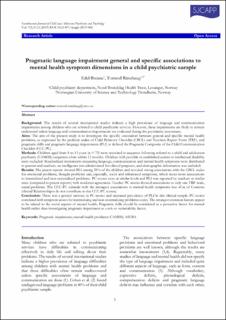| dc.contributor.author | Rimehaug, Tormod | |
| dc.contributor.author | Brenne, Edel | |
| dc.date.accessioned | 2020-03-30T08:46:12Z | |
| dc.date.available | 2020-03-30T08:46:12Z | |
| dc.date.created | 2020-03-29T13:07:31Z | |
| dc.date.issued | 2019 | |
| dc.identifier.citation | Scandinavian Journal of Child and Adolescent Psychiatry and Psychology. 2019, 7 (1), 3-12. | en_US |
| dc.identifier.issn | 2245-8875 | |
| dc.identifier.uri | https://hdl.handle.net/11250/2649312 | |
| dc.description.abstract | Background:
The results of several international studies indicate a high prevalence of language and communication impairments among children who are referred to child psychiatric services. However, these impairments are likely to remain undetected unless language and communication impairments are evaluated during the psychiatric assessment.
Aims:
The aim of the present study is to investigate the specific association between general and specific mental health problems, as expressed by the problem scales of Child Behavior Checklist (CBCL) and Teachers Report Form (TRF), and pragmatic skills and pragmatic language impairments (PLI) as defined the Pragmatic Composite of the Child Communication Checklist (CCC-PC).
Methods:
Children aged from 8 to 13 years (n = 73) were recruited in sequence following referral to a child and adolescent psychiatry (CAMHS) outpatient clinic within 12 months. Children with possible or established autism or intellectual disability were excluded. Standardized instruments measuring language, communication and mental health symptoms were distributed to parents and teachers, an intelligence test administered for clinical purposes, and demographic information was included.
Results:
The parent reports showed PLI among 38% of the children and revealed strong associations with the CBCL scales for emotional problems, thought problems and, especially, social and withdrawal symptoms, which mean more associations to internalized and non-externalized problems. PC-scores were at similar levels and PLI was reported by teachers at similar rates (compared to parent reports) with moderate agreement. Teacher PC-scores showed associations to only one TRF-scale, social problems. The CCC-PC subscale with the strongest associations to mental health symptoms was «Use of Context» («Social Relationships» do not contribute to the CCC-PC scores).
Conclusion:
There was a general increase in PC-scores and increased prevalence of PLI in this clinical sample. PC-scores correlated with symptom scores for internalizing and non-externalizing problems scales. The strongest common factors appear to be related to the social aspects of mental health. Pragmatic skills should be considered as a protective factor for mental health rather than investigating pragmatic impairment as a risk or vulnerability factor. | en_US |
| dc.language.iso | eng | en_US |
| dc.publisher | Psychiatric Research Unit, Region Zealand | en_US |
| dc.rights | Attribution-NonCommercial-NoDerivatives 4.0 Internasjonal | * |
| dc.rights.uri | http://creativecommons.org/licenses/by-nc-nd/4.0/deed.no | * |
| dc.title | Pragmatic language impairment general and specific associations to mental health symptom dimensions in a child psychiatric sample | en_US |
| dc.type | Peer reviewed | en_US |
| dc.type | Journal article | en_US |
| dc.description.version | publishedVersion | en_US |
| dc.source.pagenumber | 3-12 | en_US |
| dc.source.volume | 7 | en_US |
| dc.source.journal | Scandinavian Journal of Child and Adolescent Psychiatry and Psychology | en_US |
| dc.source.issue | 1 | en_US |
| dc.identifier.doi | 10.21307/sjcapp-2019-001 | |
| dc.identifier.cristin | 1804100 | |
| dc.description.localcode | Published by Psychiatric Research Unit, Region Zealand. License: (CC-BY-NC-ND 4.0) | en_US |
| cristin.ispublished | true | |
| cristin.fulltext | original | |
| cristin.qualitycode | 1 | |

